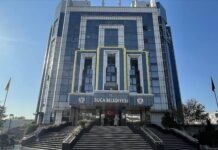In a significant escalation of an ongoing crackdown on individuals alleged to have links to the faith-based Gülen movement, Turkish Interior Minister Ali Yerlikaya on Tuesday announced the detention of 459 people across 66 provinces on terrorism accusations over alleged links to the movement.
This operation is the largest targeting alleged Gülen followers since the death of Turkish-Islamic scholar Fethullah Gülen in the US at the age of 83 on October 20.
Yerlikaya said there would be no “slackening” in the fight against the movement following the death of Gülen, whose ideas and teachings inspired the movement, echoing a similar promise made by President Recep Tayyip Erdoğan and other government officials following Gülen’s passing.
The accusations against the detainees include making “propaganda” for the movement using social media and using payphones and the now-defunct encrypted messaging app ByLock to secretly communicate with their contacts in the movement.
Turkish President Recep Tayyip Erdoğan has been targeting followers of the Gülen movement, inspired by the late Muslim cleric Fethullah Gülen, since corruption investigations revealed in 2013 implicated then-Prime Minister Erdoğan, his family members and his inner circle.
Dismissing the investigations as a Gülenist coup and conspiracy against his government, Erdoğan designated the movement a terrorist organization and began targeting its members. He intensified the crackdown on the movement following an abortive putsch in 2016, which he accused Gülen of masterminding. Gülen and the movement strongly denied involvement in the coup attempt or any terrorist activity.
The so-called “payphone investigations” are based on call records. The prosecutors allege that a member of the Gülen movement used a single payphone to call all his contacts consecutively. Based on that assumption, when an alleged member of the movement is found in call records, it is assumed that other numbers called right before or after that call also belong to people with Gülen links. The authorities do not possess the content of the calls in question. The supposition of guilt is solely based on the order of the calls made from the phone.
ByLock, once widely available online, has been considered a secret tool of communication among supporters of the movement since a coup attempt on July 15, 2016, despite the lack of any evidence that ByLock messages were related to the abortive putsch.
The detentions come despite a landmark ruling from the Grand Chamber of the European Court of Human Rights last September that found the use of ByLock not to constitute a criminal offense. The Grand Chamber ruled in the case of former teacher Yüksel Yalçınkaya that the use of the ByLock application was not an offense in itself and did not constitute sufficient evidence for an arrest.
The operation involved simultaneous raids in 66 provinces, including İstanbul, Ankara and İzmir.

In the online posting, Yerlikaya said they “will continue until cleaning [our country] of this organization.”
Following the failed coup, the Turkish government declared a state of emergency and carried out a massive purge of state institutions under the pretext of an anti-coup fight. Over 130,000 public servants, including 4,156 judges and prosecutors as well as over 24,000 members of the armed forces, were summarily removed from their jobs for alleged membership in or relationships with “terrorist organizations” by emergency decree-laws subject to neither judicial nor parliamentary scrutiny. Private individuals were also widely targeted.
In addition to the thousands who were jailed, scores of other Gülen movement followers had to flee Turkey to avoid the government crackdown.
Since the coup attempt, a total of 705,172 people have been investigated on terrorism or coup-related charges due to their alleged links to the movement. There are currently 13,251 people in prison who are in pretrial detention or convicted of terrorism in Gülen-linked trials.















